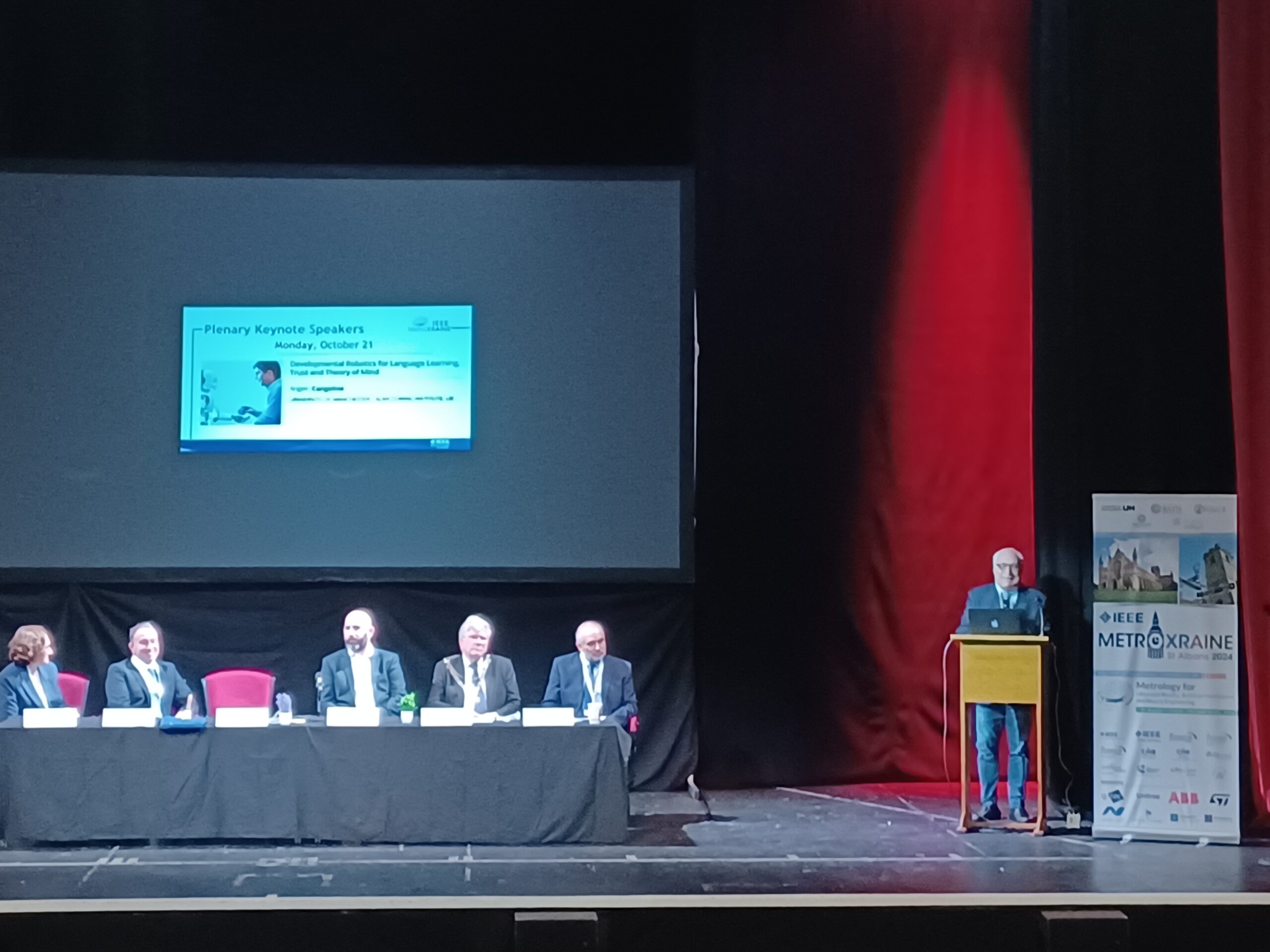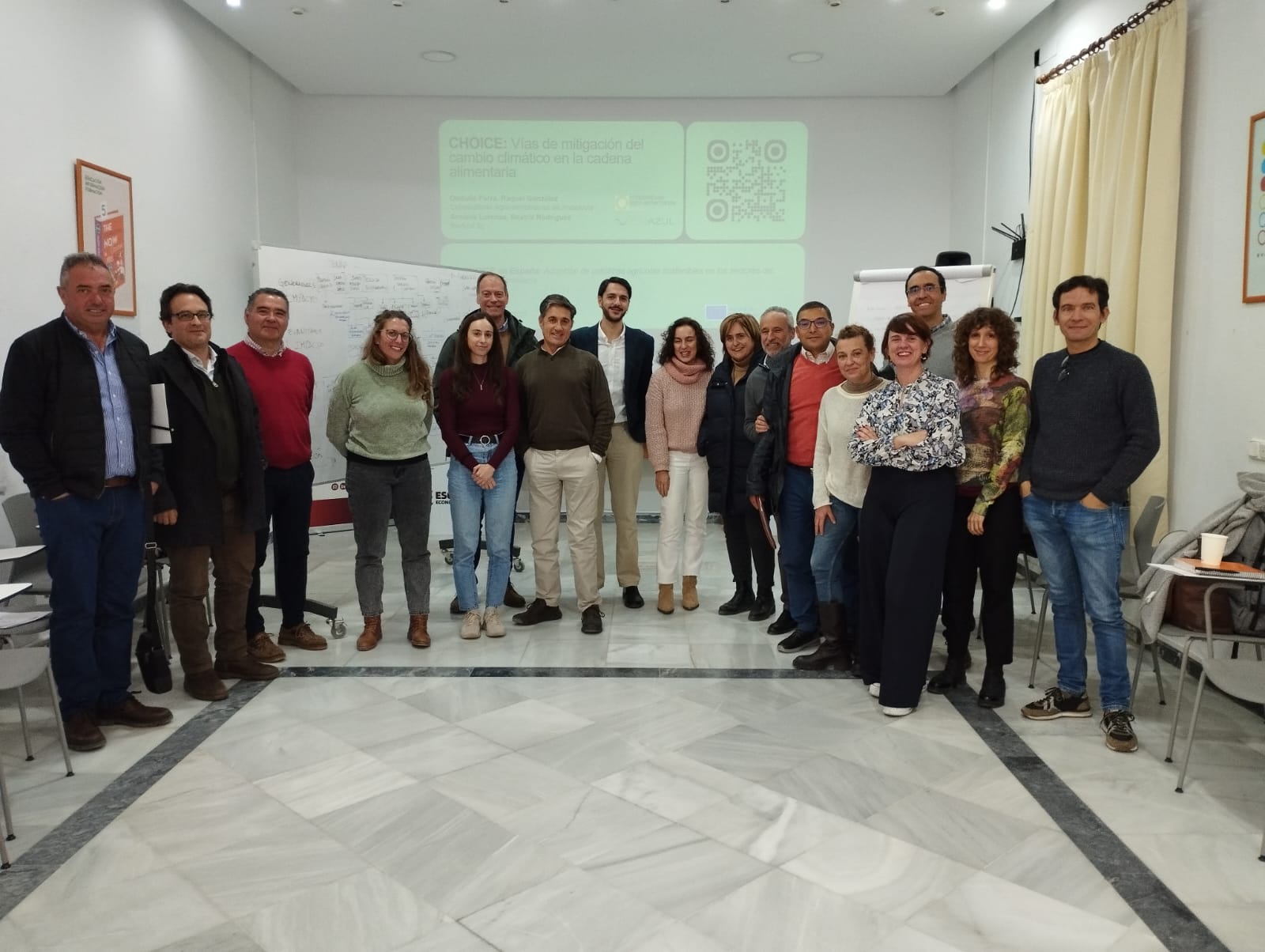
Advancing Sustainability in the Olive Sector: Insights from the Second Participatory Lab in Spain
As part of the CHOICE European project’s ongoing efforts to integrate sustainability into food systems, the Spanish pilot hosted its second Participatory Lab focusing on the olive sector. This session followed the first Participatory Lab, which addressed sustainability challenges for both olive groves and livestock farming, as well as the second lab focused on the livestock sector. The event provided a structured platform to refine sustainability measures for olive production, validate conversion strategies, and define their associated variables.
Held on February 14, 2025, at the Cooperativas Agro-alimentarias de Andalucía headquarters in Córdoba, the workshop was co-organized by Cooperativas Agro-alimentarias de Andalucía and Bioazul. Participants included farmers, cooperatives, and industry experts, who worked together to evaluate sustainable farming practices and prioritize key environmental strategies.
Key Discussions and Outcomes
The session began with an introduction to the CHOICE project and its Spanish pilot, followed by a review of results from the first Participatory Lab. Stakeholders then analyzed proposed conversion strategies—practices designed to improve sustainability in olive farming—and worked on their validation and prioritization.
Evaluation of Sustainable Conversions
Participants assessed ten conversion types identified in the first lab, refining their definitions and impact areas. Each conversion was prioritized based on feasibility and impact, with ratings from 0-10.
The top-rated and refined conversion types included:
- Strengthening integrated management as a horizontal practice as it includes holistic sustainability measures, including waste reduction, water and pesticide use.
- Increasing innovation and technology through precision agriculture techniques such as drones, sensors, and data-driven monitoring systems.
- Reducing water consumption by improving irrigation efficiency, rainwater collection, and soil conservation techniques.
- Enhancing soil health and biodiversity and reduce greenhouse gas emissions by promoting ground cover, erosion control, and agroforestry practices.
- Conversion to organic, recognized as a long-term goal but noted as difficult to implement due to advisory and financial constraints.
Each conversion type was linked to specific practices, such as:
- Precision fertilization (adjusting chemical nutrient applications based on crop needs).
- Biological pest control (introducing natural predators and hormonal traps).
- Use of renewable energy (solar panels and energy-efficient agricultural machinery).
In addition, stakeholders highlighted the importance of training, guidance and support as a horizontal action to be promoted alongside most of the identified practices.
Refining Conversion Priorities
During discussions, participants suggested redefining certain conversion categories:
- The waste reduction category was broadened into “strengthening integrated management” to encompass waste, water, and pesticide use.
- The category of soil erosion reduction was renamed “soil and fertility maintenance,” emphasizing long-term soil health strategies.
Barriers and Challenges Identified
Stakeholders highlighted several barriers to implementing sustainability measures in olive farming. Among the main concerns were:
- Limited advisory services for organic farming, which lacks sufficient technical guidance compared to integrated management.
- Financial dependency on government incentives, with peaks in organic conversion coinciding with available financial aid.
- Farmer hesitation towards new technologies, as the adoption of precision farming and digital tools remains low due to unfamiliarity and perceived complexity.
To address these challenges, participants emphasized the importance of financial profitability data, practical case studies, and targeted training programs to facilitate the adoption of sustainability practices.

Stakeholder Preferences for Sustainability in Olive Farming
One of the most insightful activities during the lab was the evaluation of discrete choice experiments designed to support the CHOICE project. Participants completed a questionnaire ranking 11 key aspects of sustainable olive production, providing valuable data for CHOICE’s modeling.
The ranked aspects included:
- Farming intensity
- Yield and profitability
- Water use efficiency
- Soil health (erosion, nutrients)
- Drought resistance
- Risk of crop harvest failure
- Precision farming (drones, sensors, automated irrigation)
- Biodiversity conservation
- Labor and daily effort required
- Financial support preferences (upfront capital vs. per-hectare compensation).
Participants were also classified based on whether they were olive growers, and if so, whether they operated organically or not.
This activity provided critical insights into farmers’ priorities and will inform future CHOICE awareness and engagement campaigns.
Next Steps: Strengthening Collaboration for Sustainable Olive Farming
The second Participatory Lab of the Spanish pilot focusing on the olive sector concluded with a commitment to refining strategies for sustainable olive farming. Moving forward, the pilot will focus on:
- Developing advisory and training services to support farmers in implementing sustainability measures.
- Enhancing collaboration between cooperatives, researchers, and policymakers to bridge the gap between research and practical application.
- Refining economic models and incentive structures to ensure sustainability transitions are financially viable.
- Conversion strategies—practices designed to improve sustainability in olive farming.
As part of CHOICE’s broader efforts, upcoming sessions of the 3rd Participatory Lab series will continue to develop targeted strategies to improve environmental sustainability in Spanish agriculture resulting on the design of impactful Awareness and Engangement Campaigns.
Stay tuned for more updates and follow the progress of the Spanish pilot’s work on sustainable olive grove management.
Learn more about the Spanish pilot of Choice at: https://www.climatechoice.eu/pilot-campaigns/spain/






